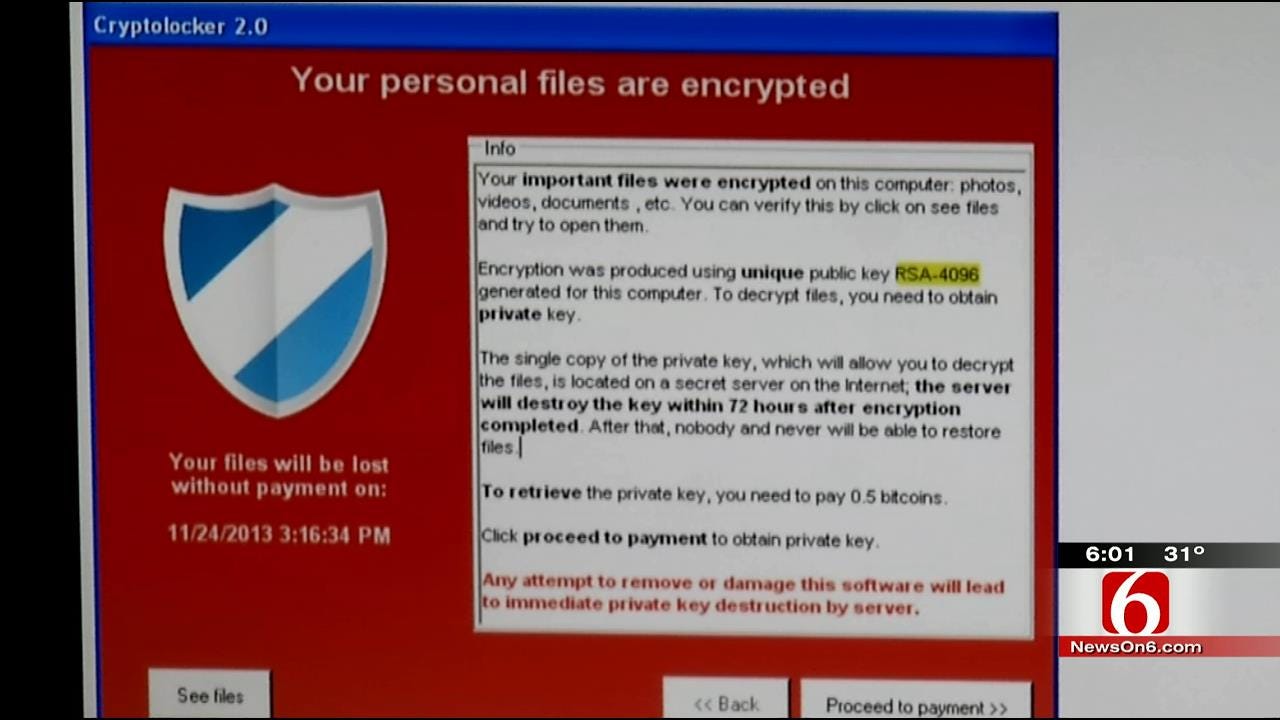Hackers Now Hijacking Computers, Holding Info For Ransom
Ransomware is a software that takes control of everything on your computer and hard drive and encrypts it. It holds your information hostage until you pay a ransom.Wednesday, November 12th 2014, 6:36 pm
We have a warning about a new type of extortion that comes through your computer.
Ransomware is a software that takes control of everything on your computer and hard drive and encrypts it. It holds your information hostage until you pay a ransom to get it released, and it's happening in Tulsa.
There are two types of Ransomware.
The first is a scam. A government warning pops us and says your computer has been locked, but if you pay a fine with a money card, they'll unlock it.
Never pay them.
An expert can take off the bad software pretty easily.
But the second one is where hackers actually control and encrypt your data. You may have to pay the ransom.
That type of Ransomware is called cryptolocker.
People can get it by downloading illegal music or pornography or a gambling website or mistakenly clicking on a link in an email or a video posted on Facebook.
The hackers encrypt your data and only they hold the key of password. For a business, that's confidential information about clients. For a home computer, it's all your family photos, tax documents, everything.
The hackers demand to be paid in bitcoins, which is anonymous and untraceable.
"If you need the data, you've got to pay them. If you didn't have backups in other locations, you definitely have to pay them,” Avansic's Gavin Manes said.
It's maddening, but several businesses in Tulsa have paid, even a sheriff's office in Tennessee paid.
Two key things you can do to avoid paying: First, use granular backup, which constantly backs up everything on frequent basis, daily, hourly, even minute by minute.
Then, if you get hit, wipe your computer clean and reload it with your backed up information. There's no need to pay ransom.
Secondly, just like most companies have a separate computer administrator, you should have a separate administrator log in and password at home, which limits what the Ransomware can access.
"Whenever you're going to install something, you should have to type in a password or phone a friend," Manes said.
If you get the ransom notice, and have an external hard drive or thumb drive plugged in, unhook them immediately to maybe limit the damage. Call an expert immediately.
Don't click on links until you verify who they're from and if a video needs you to do download software to view it -- don't do it.
Just like people didn't have to lock their doors in times past-- same thing here. People didn't have to have backup their data constantly, but now they do.
Watch the attached Web Extra videos for more tips from Gavin.
More Like This
November 12th, 2014
April 15th, 2024
April 12th, 2024
March 14th, 2024
Top Headlines
April 18th, 2024
April 18th, 2024











